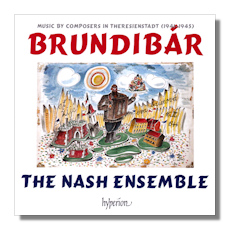
The Internet's Premier Classical Music Source
Related Links
-
Haas Reviews
Klein Reviews
Krása Reviews
Ullmann Reviews - Latest Reviews
- More Reviews
-
By Composer
-
Collections
DVD & Blu-ray
Books
Concert Reviews
Articles/Interviews
Software
Audio
Search Amazon
Recommended Links
Site News
 CD Review
CD Review
Music by Composers in Theresienstadt

(1941-1945)
- Hans Krása: Suite "Brundibár"
- Viktor Ullmann: Quartet for Strings #3, Op. 46
- Gideon Klein: Trio for Violin, Viola & Cello
- Pavel Haas: Quartet for Strings #2 "Z opicich hor", Op. 7
Nash Ensemble
Hyperion CDA67973
The Nash Ensemble (founded as long ago as 1964) is on top form in this intelligent compilation of four chamber works by composers who share the lamentable distinction of having been murdered by the Nazis in Auschwitz in 1944 or 1945. In the spirit of celebrating the hope with which they each wrote, it's also to be noted that the four Jewish Czech composers whose work is to be heard here (though none of it for the first time on CD) all represent a lost generation of composers from that world – Mitteleuropa after World War I. That the nine members of the Nash Ensemble approach the music without sentimentality, that they expose its strengths and weaknesses and are determined to give us an hour and a quarter's enthralling music-making as music, not documentary, is to be commended.
David Matthews's arrangement of Hans Krása's (1899-1944) suite from his children's opera, Brundibár, is catchy, light and melodic, breezy and uplifting. The Nash Ensemble simply plays the music; and plays it well with nuance, color and drive. They don't feel it necessary to perform with our knowledge that Hans Krása was already in Theresienstadt by the time of its first performance of over 50 at the time. Ullmann's (1898-1944) third String Quartet, Op. 46, is lyrical, pointed, though rarely with the bite of the more adventurous of his contemporaries… indeed it's Ravel-like in places – the end [tr.11] in particular.
The string Trio by Gideon Klein (1919-1945) is equally wistful, dour yet expansive. In common with the other pieces on the CD, it has nothing of the emaciated or pathetic about it. Although the second movement [tr.13] is a set of variations on a Moravian folksong, it's not easy to discern a strong Czech feeling. Yet the slow passages in that movement are sad without ever touching on the lugubrious. Again the playing by the Nash strings is precise, unmannered and focused.
Pavel Haas' (1899-1944) second string quartet, Op. 7 "Z opicich hor" ("From the Monkey Mountains") is also inspired by the Moravian landscape. While Haas' is certainly the most thoughtful music this, the longest work here at half an hour, and perhaps the most penetrating piece of the four, also has light moments. The Nash Ensemble's same four string players (Stephanie Gonley and Laura Samuel, violins; Lawrence Power, viola; Paul Watkins, cello) achieve well the necessary balance and perspective to move the piece forward while not losing any of the penetrating (self-)reflection that's necessary to add the depth and meaning of the work.
Haas' string quartet is likely to be the piece – brooding and regretful – most closely expected by those coming to the CD for understanding of the strange musical flourishing in Thereseientadt. Each of the four pieces here embodies in its different way the Will to Live, to which Ullmann in particular alludes. Given that one in four of the 60,000 "inhabitants" of Theresienstadt (a staging post for the extermination camps meant to support a tenth that number) died there, any levity is remarkable. Yet even in this quartet, irony and humor there are… in the onomatopoeic writing of the second movement [tr.16], for instance. Ultimately, though, this work too truly is legitimate music, not movements that manage to snatch coherence from circumstance. This is the spirit in which the players have conceived the CD and in which they so successfully carry it all out.
The acoustic (St. Michael's Church, Highgate in London) is "friendly" and spacious enough for a good soundstage to add to the pleasure we get – particularly from Brundibár. In that these are pieces in which the individual instrumental lines and combinations of textures and timbres must be heard, the space and depth of the location serve the result well. The CD's booklet has just the right amount of information. So if either the worlds and/or works of these four composers appeal(s) to you, you won't go wrong with these performances.
Copyright © 2013, Mark Sealey





















